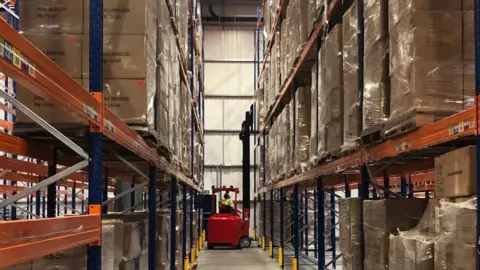Brexit: Hornby stops non-UK orders due to price confusion
 Getty Images
Getty ImagesModel railway maker Hornby is pausing all international orders until January next year because of uncertainty around post-Brexit trade rules.
"We hope you can understand the difficult position we are in and remain patient with us until we can find a solution," the company said on Twitter.
Hornby, which also makes Corgi cars and Scalextric racing kits, said non-UK orders can resume on 4 January 2021.
The company said port congestion issues are also affecting its operations.
Allow X content?
It is still unclear what rules will apply to UK-EU trade after the transition period ends on 31 December, but talks negotiations are continuing this week after the two sides failed to reach a deal by an agreed deadline on Sunday.
However, time is running out and businesses say they need clarity.
If a free trade deal can't be done, tariffs, extra taxes, are expected to be added to goods imported from the EU, and on British products exported to the bloc.
Hornby boss Lyndon Davies said: "Within Europe people are already asking us: 'If I buy something, are those tariffs already included in your pricing?' Because we don't know what's going to happen, it's just a very difficult position."

There are also huge problems shipping products to the UK, because of bottlenecks at ports such Felixstowe and Southampton, Mr Davies said.
Some shipping firms have been bypassing UK ports and unloading cargo in continental ports instead, to avoid the congestion and delays.
"I had a ship that should have arrived three weeks ago with Batman vs Joker Micro Scalextric sets. They've travelled the world. They've been to Rotterdam, Rotterdam was busy. We couldn't get a truck," Mr Davies said.
"You've got a pandemic, you've got Brexit, you've got a container shortage. It's chaos."
'Shuffling deck chairs'
The Hornby boss said the political leaders engaging in trade negotiations "aren't living in the real world".
"We as a country, we're shuffling the deck chairs as the Titanic is sinking. People who are having these talks just don't understand how the real world operates. They think at the last minute they can come up with a solution. People are going to be losing jobs."
Many UK companies have spent the last few months stockpiling goods and materials imported from abroad to mitigate against possible disruption to trade and supply chains at the end of the year. Mr Davies said he began "over-shipping" Hornby products months ago.
But some business leaders say they don't expect much to change.
Alex Baldock, the boss of Dixons Carphone, which owns Currys PC World, said: "As far as Brexit is concerned, we're ready.
"We think there are about two days of supply delays that we're going to face and we can handle that. That's a reasonable worst case," he told BBC Radio 4's Today programme.
'A perfect storm'
With so many firms stockpiling though, demand for warehouse space in the UK is in danger of reaching full capacity, according to the logistic industry.
 One Retail Group
One Retail Group"In the run up to Brexit... importers have been getting stock in just to mitigate the risk of any potential disruption come January, the end of the transition period," said Peter Ward, chief executive of the UK Warehousing Association.
"The danger signs at the moment are that we're running at full capacity, in a bit of a perfect storm."
Mr Ward said that while the pandemic is still affecting supply chains, firms have been preparing for Brexit and there's been huge shipments of PPE. Those factors have combined to create a backlog of stock in warehouses, just as the logistics sector reached the peak Christmas season.
"In addition to all of that, there's an exponential growth in e-commerce going on out there which is really bringing about transformational change in the logistics sector, which really started a long time before the pandemic but has accelerated over the last several months."
